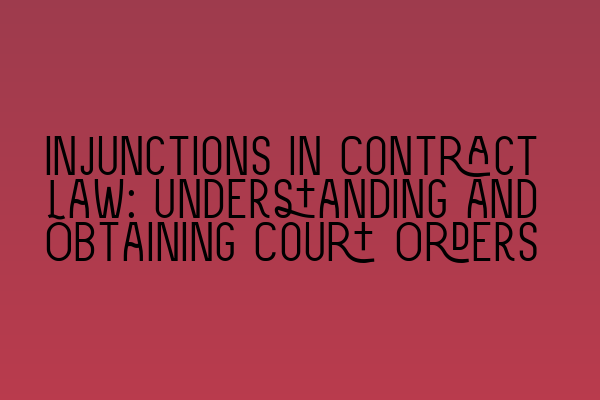Injunctions in Contract Law: Understanding and Obtaining Court Orders
When it comes to contract law, sometimes disputes and breaches can occur that require immediate action. In such cases, obtaining an injunction from the court can be a vital legal tool to protect your rights and seek remedies. In this article, we will delve into the concept of injunctions in contract law, explore their types, and discuss the process of obtaining court orders. So, let’s dive in!
What is an Injunction?
An injunction is a court order that requires a party to either do something or refrain from doing something. It is designed to preserve the status quo and prevent further harm or damage. In contract law, an injunction can be sought when one party breaches or threatens to breach contractual obligations, causing irreparable harm to the other party.
There are generally two types of injunctions in contract law:
- Prohibitory Injunction: This type of injunction restrains a party from performing a specific act or continuing with certain activities that would breach the contract.
- Mandatory Injunction: A mandatory injunction, on the other hand, compels a party to take positive action to fulfill their contractual obligations.
The Process of Obtaining an Injunction
Obtaining an injunction in contract law involves a series of steps, starting with evaluating the situation and deciding whether an injunction is necessary and appropriate. Here’s a breakdown of the process:
Step 1: Consulting with Legal Counsel
The first step is to consult with an experienced solicitor who specializes in contract law. They will assess the circumstances, review the contract, and advise you on the merits of seeking an injunction.
If you’re in need of legal assistance for your contract law matters, SQE Contract Law offers top-notch solicitors who can guide you through the process. They provide excellent preparation courses for SQE 1 and SQE 2 exams, ensuring their solicitors are well-equipped with the necessary knowledge to handle your case effectively.
Related Article: SQE 1 Preparation Courses
Step 2: Drafting the Injunction Application
Your solicitor will assist you in drafting the injunction application, which should clearly state the details of the breach, the relief sought, and any supporting evidence. It is important to provide a strong and compelling argument supported by relevant legal principles.
Step 3: Filing the Application in Court
Once the injunction application is drafted, it needs to be filed with the appropriate court. The court will review the application and may require additional information or documentation.
Related Article: SQE 1 Practice Mocks FLK1 FLK2
Step 4: Attending the Hearing
After filing the injunction application, a hearing will be scheduled. During the hearing, both parties will have the opportunity to present their arguments and evidence before the court. It is crucial to have skilled legal representation who can effectively advocate for your position.
Step 5: The Court’s Decision
Upon considering the arguments and evidence presented, the court will make a decision on whether to grant or deny the injunction. The court will take into account various factors, such as the urgency of the matter, the likelihood of success, and the balance of convenience.
If the court grants the injunction, it will issue a court order outlining the terms and conditions of the injunction and the consequences for non-compliance.
Final Thoughts
Injunctions play a crucial role in contract law, serving as a powerful tool to protect parties’ rights and secure remedies for breaches. Understanding the types of injunctions and the process of obtaining court orders is essential for anyone involved in contract disputes.
Remember, if you find yourself in need of legal advice or representation for contract law matters, it’s always recommended to consult with experienced solicitors who specialize in the field. SQE Contract Law provides exceptional solicitors who excel in contract law and can guide you through the entire process.
Related Articles:
